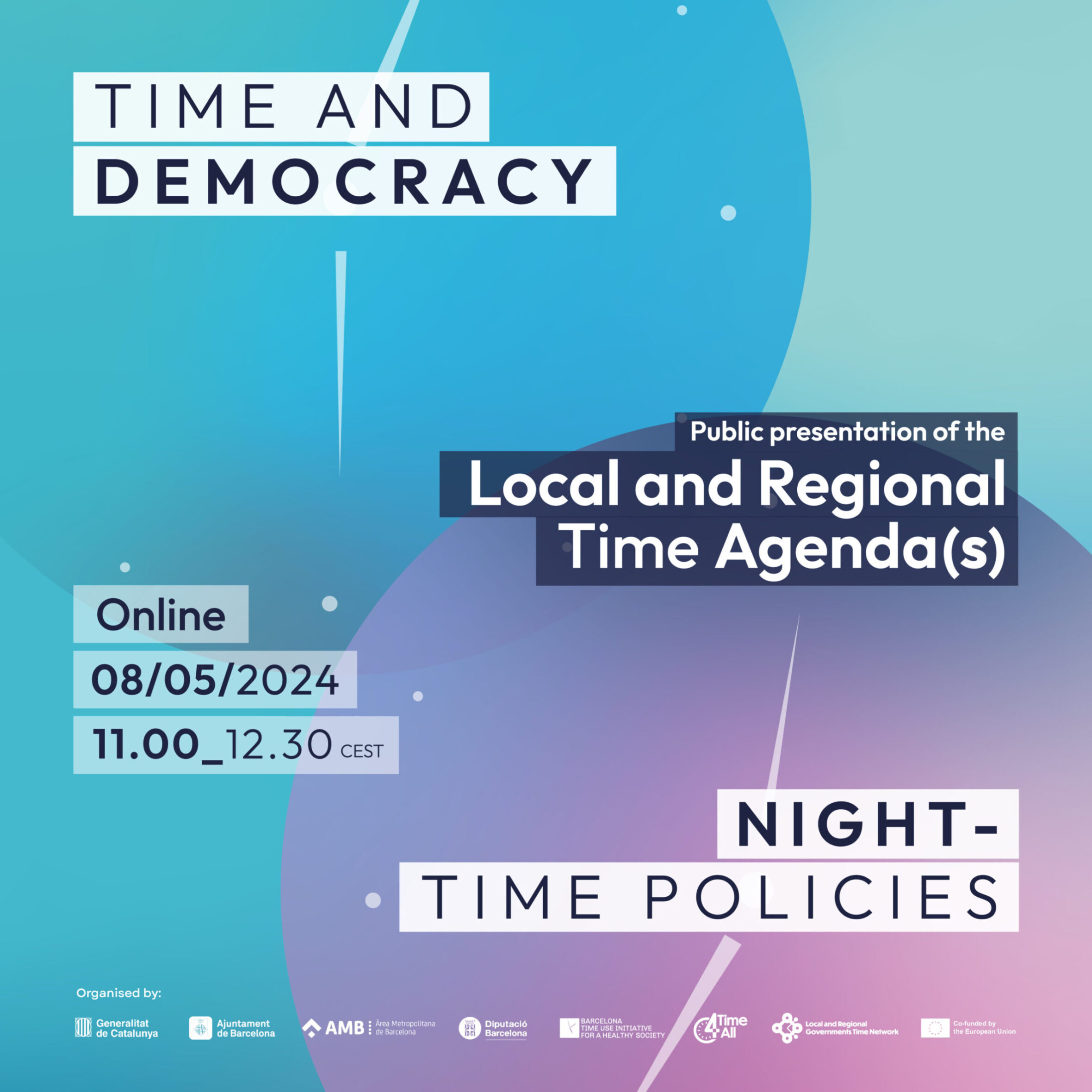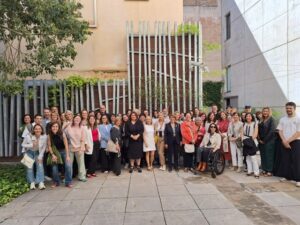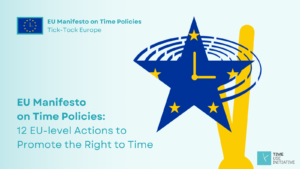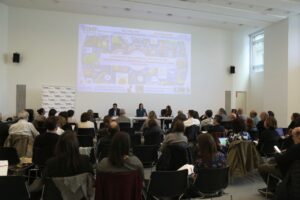- Representatives of London, Trento and Strasbourg presented examples of best practices of night-time policies as implemented in their cities. These are all in relation to how they navigate the urban night from a holistic point of view, considering it in the frame of a 24-hour city. Night governance strategies and the model of Night Mayors were presented as part of a global trend, together with specific policies aiming at creating secure, inclusive and respectful leisure as part of the nightlife.
- The second block of the event was introduced by the European Association for Local Democracy (ALDA). The session showed the practice of time policies implemented in Milan and Barcelona as a way to enable democracy and civic participation by facilitating time for citizens to take part in public activities.
Taken place on May 8, this document chronicles the main conclusions taken from the online public presentation of the Local and Regional Time Agenda’s volumes 3 and 4 organized by the Local and Regional Time Network and financed by the Time4All project of the European Commission. Such explores the relations between time policies and democracy in addition to time policies and the night.
Up to 40 best practices implemented by local, metropolitan and regional authorities from distinct corners of the world are compiled in these two publications, tackling these two time-related issues of global relevance, grouped into different topics, from civic participation or e-democracy to granting inclusive leisure nightlife and night governance. Both volumes include a theoretical approach by experts and practitioners, as well as practical recommendations based on transferable policies already implemented.
The Local and Regional Time Agenda is a pioneering compilation of time policies implemented by local, metropolitan and regional authorities from distinct corners of the world. The Agenda aims to become a leading guide for institutions interested in utilizing time policies to transform the society of the 21st Century—ensuring the right to time by making it healthier, more egalitarian, efficient and sustainable for all.
Marta Junqué, Director of the Time Use Initiative introduced the session and the work of the Local and Regional Time Network, by remarking: “We need a better balanced time organization; cities and regions must work together for it; we invite everybody to join the Local and Regional Time Network and become an important stakeholder in time policies…We chose these two themes because they are part of the main public concerns. The right to time is key to strengthening citizen participation and democracy – and urban policies at night, we need to stop looking at it only from a security point of view and we need to achieve a pact for an inclusive and respectful night with the different uses and activities.”

24-hour cities and the figure of the night mayor
We began the first block with examples of night-time policies, presenting the best practices of London, Trento and Strasbourg. At the question of how a city plan can govern the night, Julieta Cuneo, Policy Lead from the 24 Hour London Team from the Greater London Authority explained how “We consider night as broadly as we would the day. We use a wide lens, looking at the wealth of activities that happen from 6 p.m. to 6 a.m.” She then related to how 2016’s newly appointed mayor created a night commission to make the night healthier and safer; “we have changed the narrative, we think of the city in 24h time, with a holistic approach; for instance, we talk of the economy at night, instead of the night-time economy”. Then, after the 2019 first Night Time Commission “Think Night” report, the 24-hour London became a cross-cutting principle for City Hall. “We developed the night test, a tool to ensure all colleagues at the City Hall consider the impacts of the different department’s policies on the 24-hour city”, explained Cuneo, showing the importance of the transversality of time policies. “Now a third of London’s boroughs have included night-time policies in their action plans” said the policy advisor.
Then Giulia Casonato, Executive councilor for Sustainability, Innovation and Participation of the Trento City Council, took the floor explaining how Trento arrived at the appointment of a Night Mayor: “We became aware of the absence of suitable urban spaces for nightlife, of the lack of night cultural offer and data and narrative on the night time as well as of the lack of political debate on night time and night time management”. In 2021, they appointed a Night Mayor intending to improve night-time coexistence and address the need for evening and night-time sociability, through transversal work with the different departments, becoming by 2023 a consolidated role included in an executive government position. She explained how the Trento City Hall has developed different policies based on the nightlife as a place of growth, expression, hybridization and creation; some examples of these policies are an on-demand public night bus, the animation of parks with cultural activities at night, acoustic monitoring of events to raise awareness about the safety perception.
On her side, Marina Lafay, Councillor of Strasbourg City Council, World Capital of Time Policies 2024, explained their new public policy addressing night time: “In the past, we referred to the night time only regarding licenses and opening times for restaurants and bars, but now we think of nights with a more systemic vision; we opened a specific department for nightlife, to assure the different uses of the city at night, developing policies for a peaceful and more secure night” “Developing time policies at night contributes to the economy and well-being and is a way to face the heat waves as a result of climate change”, she pointed as another reason for the urban night-time policies. “Two years ago this was revolutionary, but now we are going into new challenges such as assuring the respect for the city’s heritage and the development of activities for all tastes, especially for children”. She also announced they were ready for a steady night-time governance body in the City Hall by this autumn.
From this first session, one of the main conclusions would be that night-time must be looked at in the same way as we look at how we organize the time during the day. There must be night policies, to stop seeing the night as a problem but to see it as a part of life in the city where various interests and activities coincide. To do this, it is important to have a “Night Mayor”, and a global and holistic view of the night-time. It is also necessary to have data on the use of time at night, to orientate public policies.

The right to time is a key element in strengthening democracy
The 2nd block on time policies related to democracy and civic participation counted with the participation of representatives of the cities of Barcelona and Milan, introduced by Antonella Valmorbida, Secretary General of European Association for Local Democracy (ALDA). She said that “improving democracy means to deepen it and to make sure that the participation goes further of voting and implies a continuous process of civic participation of citizens, a truly participatory democracy”. As the European Economic and Social Committee recognized in 2021, “the lack of time affects the involvement in society and civil organization”; If we want truly democratic societies, we must ensure that people have the time to participate in them; this will not just strengthen democracy; it will also a sustainable development to achieve sustainable cities and communities.
Then Alessia Mastroleo, Public policy expert at the Urban Economy, Fashion and Design Department of the Milan City Council explained the City Hall commitment to empowering local communities through 3 programs that highlight the role of citizens, third-sector organizations and businesses as civic actors. One of these programs is the M15-Space and services for a 15-minute Milano, with the vision of supporting local businesses’ investments to create and/or improve spaces and services with a social impact that were absent or poor in their area, enabling the participation of the neighbors in the design of these services and providing them with more free time for other activities.
After the Milano examples, Arnau Monterde, Director of Democratic Innovation at the Barcelona City Council explained about the platform Decidim and how it relates to allowing increased participation by citizens. “Decidim is an open source democratic digital platform to enable citizens participation in the governance of Barcelona; it enables to plan hybrid meetings, online debates, participatory strategic planning, citizens assemblies and participatory budgeting; today is an international reference, with more than 450 democratic organizations using it today, in 30 countries, 240 cities and government organizations and 180 social organizations all over the world” “It is important to have tools such as Decidim to improve the possibility of the citizens to be part of their city, it enables participating at the time you can or want,” says Monterde; “we need to liberate time for life and that also means to have time to take part in the common aspects of life in the city”.
As a main conclusion of this second block, we can affirm a direct relationship between having time policies and democratic strengthening. Also at the heart of democratic citizenship lies the implicit right to time. Ensuring this right, and that every citizen has the necessary temporal resources, is key to an inclusive democracy.
To conclude the Time Agendas presentation, Marina Lafay made some closing remarks as representative of the World Capital of Time Policies, Strasbourg. “With global warming, night time will provide us opportunities as more time for new activities; it can also narrow inequalities by providing spaces to fight violence and insecurity; the problems of the night are the problems of the day,” She remarked that “cities need to go together and exchange expertise and learn from each other; this is the goal of the Local and Regional Time Network and the Time4All project”.








